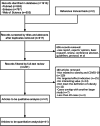Obesity aggravates COVID-19: An updated systematic review and meta-analysis
- PMID: 33200825
- PMCID: PMC7753795
- DOI: 10.1002/jmv.26677
Obesity aggravates COVID-19: An updated systematic review and meta-analysis
Abstract
This review aimed to evaluate the impact of obesity on the onset, exacerbation, and mortality of coronavirus disease 2019 (COVID-19); and compare the effects of different degrees of obesity. PubMed, EMBASE, and Web of Science were searched to find articles published between December 1, 2019, and July 27, 2020. Only observational studies with specific obesity definition were included. Literature screening and data extraction were conducted simultaneously by two researchers. A random-effects model was used to merge the effect quantity. Sensitivity analysis, subgroup analysis, and meta-regression analysis were used to deal with the heterogeneity among studies. Forty-one studies with 219,543 subjects and 115,635 COVID-19 patients were included. Subjects with obesity were more likely to have positive SARS-CoV-2 test results (OR = 1.50; 95% CI: 1.37-1.63, I2 = 69.2%); COVID-19 patients with obesity had a higher incidence of hospitalization (OR = 1.54, 95% CI: 1.33-1.78, I2 = 60.9%); hospitalized COVID-19 patients with obesity had a higher incidence of intensive care unit admission (OR = 1.48, 95% CI: 1.24-1.77, I2 = 67.5%), invasive mechanical ventilation (OR = 1.47, 95% CI: 1.31-1.65, I2 = 18.8%), and in-hospital mortality (OR = 1.14, 95% CI: 1.04-1.26, I2 = 74.4%). A higher degree of obesity also indicated a higher risk of almost all of the above events. The region may be one of the causes of heterogeneity. Obesity could promote the occurrence of the whole course of COVID-19. A higher degree of obesity may predict a higher risk. Further basic and clinical therapeutic research needs to be strengthened.
Keywords: COVID-19; ICU admission; hospitalization; in-hospital mortality; invasive mechanical ventilation; obesity; positive SARA-CoV-2 test result.
© 2020 Wiley Periodicals LLC.
Conflict of interest statement
The authors declare that there are no conflict of interests.
Figures



References
-
- https://www.worldometers.info/coronavirus/. Accessed August 20, 2020.
Publication types
MeSH terms
LinkOut - more resources
Full Text Sources
Medical
Miscellaneous

